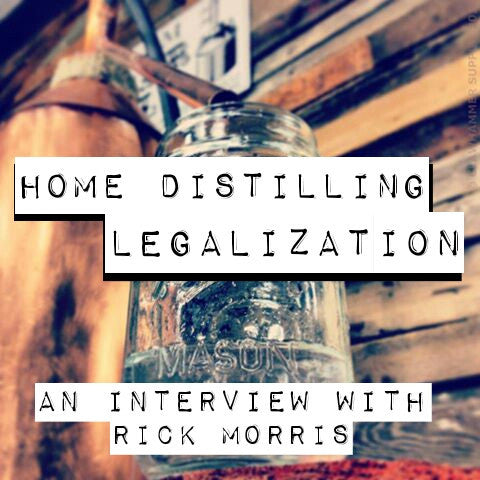This blog provides information for educational purposes only. Read our complete summary for more info.
Home Distilling Legalization Update
Following is interview with rick Morris: Founder of the Hobby Distiller's Association on the The Craft Beverage Modernization and Tax Reform Act of 2015.
Before we get started, a reminder: Distilling alcohol is illegal without a federal fuel alcohol or distilled spirit plant permit as well as relevant state permits. Our distillation equipment is designed for legal uses only and the information in this article is for educational purposes only. Please read our complete legal summary for more information on the legalities of distillation. We get a lot of emails from different folks asking the same question: Is it legal to make moonshine at home? The answer is no. In the United States, under Federal Prohibition-era law, it is illegal to manufacture spirits at home for personal consumption. It is, however, legal to make essential oils, distilled water, and with proper permits (federal, state, and local) fuel alcohol. It's possible to get a "Federal DSP" as well as local permits and open a commercial spirits distillery. But for the most part, distilling alcohol at home is not possible.
We get a lot of emails from different folks asking the same question: Is it legal to make moonshine at home? The answer is no. In the United States, under Federal Prohibition-era law, it is illegal to manufacture spirits at home for personal consumption. It is, however, legal to make essential oils, distilled water, and with proper permits (federal, state, and local) fuel alcohol. It's possible to get a "Federal DSP" as well as local permits and open a commercial spirits distillery. But for the most part, distilling alcohol at home is not possible.
However, there is a group of people fighting for home distilling to be legalized. This effort is being led by Rick Morris, founder of the Hobby Distiller’s Association, which since 2014 has been lobbying for federal legislation to make home distilling for personal consumption legal. Rick was gracious enough to fill us in on what has been going on with where those bills stand, what they include and what people interested in home distilling might expect to see in the coming year.
When the Hobby Distiller’s Association first started fighting for home distilling to be legal, they didn’t have the specifics quite figured out.
“We just thought, ‘O.K., we can lo longer sit here and talk about this,’” Morris told Clawhammer Supply during a recent interview. “We thought, ‘It’s time for action.’”
With bills pending before both the U.S. Senate and House of Representatives, it’s fair to say that the association, which represents about 1,200 to 1,300 home distillers, has been active. But the road to get to this point, and the road ahead, are long.
Back in 2014, the association started by suggesting that the Treasury Department issue a permit, which would have required home distillers to pay a fee to the Alcohol and Tobacco Tax and Trade Bureau in exchange for the right to distill a limited amount of liquor at home.
“We were throwing anything at them where we thought they’d be happy to say ‘yes,’” Morris said.
But the bureau wasn’t interested.
“The numbers were too small,” Morris said. “It would have probably cost them more to enforce than they would have collected.”
The bureau, Morris believes, was more interested in seeing enforcement of home distilling prohibition laws off their plates entirely.
“We’ve got meth labs out there, and other things that, obviously, we know are the bigger concerns to the public,” he said. “The home distiller – this is small potatoes.”
Once that became clear, the Hobby Distiller’s Association’s focus shifted to outright legalization.
The first draft of the first bill to legalize home distilling looks very different from what is before Congress today. Home distilling, in that bill, would have had regulations comparable to home brewing or home winemaking. Some legislators pushed back, asking for hard statistics about safety, primarily about fires started during home distilling.
Home distilling has been legal in New Zealand since 1996, and in that country, distilling equipment gets its own category in national fire statistics. Since home distilling became legal there, New Zealand has reported just a handful of fires.
“It’s actually proven to be safer than just cooking a meal on a stove,” Morris said.
With those safety questions answered, the association pushed even harder for the bill. But then, the liquor industry complained. The original bill would have allowed home distillers to craft 100 gallons of spirits at home, in line with what home brewers are permitted to create, but an amount that even Morris believes is excessive.
“One hundred gallons of beer, that’s one thing,” he said. “One hundred gallons of spirits, that’s totally different.”
The bills in Washington now would allow a distiller to produce 24 to 48 gallons of spirits a year at home, depending on if the distiller lived alone or with another adult. Legislators also rolled the language that would legalize home distilling into a larger bill about the craft alcohol industry, helping it get support from larger alcohol-based companies.
Morris is confident that legalizing home distilling could bring a surge in craft spirits.
“It happened in home brewing,” he said. “And it happened in New Zealand. Everything points to that being the case.”
But first, the bill has to become law. And legislators in Washington already have been hemming and hawing about it for nearly a year.
The Craft Beverage Modernization and Tax Reform Act of 2015, the bill that would, among other things, legalize home distilling, was introduced in both the Senate and the House in the summer of 2015, The Senate bill so far is stalled with the Senate Finance Committee. The House bill hasn’t been discussed on the floor of Congress since last July.
The Home Distiller’s Association is working with a lobbyist in D.C., and Morris and others have made multiple trips to the Capitol to argue on behalf of the bill.
“I like to say that things happen at the speed of government, and I don’t mean that in a bad way,” Morris said. “People don’t realize how many little steps are involved. It does take time. And this isn’t a home distilling bill – we are part of a bigger bill – so all of those steps have to happen for every piece of this thing.”
Still, Rick is optimistic that the bill will pass. The House bill has 172 cosponsors – 100 Republicans and 72 Democrats – indicating that at least that many representatives would vote in favor of it becoming law. It needs 218 votes to pass.
Industry lobbyists from big beer, big liquor and the craft beer industries all have been pushing for the bill to pass as well.
“This is the first time that something has been introduced that everyone is behind,” Morris said. “But with all that said, we have to get the senators and representatives and everyone to actually move it forward.”
Morris said we all will know one way or another by the end of 2016. If the bill hasn’t passed by the time the 114th Congress breaks at the end of the year, Morris and others who have been pushing the bill forward will need to start again.
“If it’s not passed by the end of the year, it goes away, it’s done,” he said. “It’s got lots of support, but it’s got to move through the channels… But they can look to New Zealand and see that the sky didn’t fall and people aren’t blowing their houses up. There’s no guarantee, but we’re cautiously optimistic.”




Good point Jim a form letter would be a great way to get this in the face of congress. State by state we may make a big enough noise to get what we want. Freedom to make for our selves. Heck, George Washington made booze.
I have no desire to see “craft distilling” legalized. I would however, like to see “hobby distillation” legalized. Produced for personal, family, or close friends. Never sold or distributed for money. Maximum of 50 gallons per year. Distilled outside only. Fire extinguisher near by. Maximum still size of 10 gallons. 21 years old. Passive enforcement.
In Arizona, and other states,, majariuana is now legal, brew beer and make wine. Let us old veterans have fun making a little liquor.
what about in Canada?
With the recent Covid 19 outbreak and the resultant shortage of hand sanitizer, this may be an opportune time to readdress this issue. The ability to produce Alcohol might not be so frowned upon in the light of recent events.
Although still illegal according to federal laws, MO state laws allow for 100 gallons of liquor to be distilled per year if at least one person is of age 21 resides in the home and if two or more individuals of age 21 or over, up to 200 gallons annually. as long as one is not making big batches or selling, it is considered like weed in Colorado. the only difference being weed is not federally taxed. so all alcohol home distilled must be for own use which does include gifting.
I’m a pessimist by nature, and inherently doubt You’ll get anywhere with this. But oh, how I hope I’m wrong! Good luck! You’ll need it!
I can’t wait till we get something moving in this country on this hobby distillers Bill. I myself want to open a small craft Distillery only doing maybe ten thousand gallons a year anyways keep up the good work you have my support
I think its time for congress to out there butts and pass this bill. the distillation of alcohol as a hobby and for home use should be legalized without any questions. I brew beer and would love to make some moonshine to.
pOEPLE SHOULD BE ABLE TO DO ANYTHING THEY WANT IN THEY’RE OWN HOMES BEHIND CLOSED DOORS AS LONG AS THEY CAUSE NO HARM TO OTHER PERSON. IT’S NO DIFFERENT FROM MAKING BEER OR WINE AND THE GOVERNMENT SHOULD COME IN AND MAKE SURE THE PEOPLE ARE DOING IT RIGHT AND SAFE AND GIVE TRAINING TO DO SO, WITH CERTIFICATION FOR PUBLIC PEOPLES.
s.236 S.236 – A bill to amend the Internal Revenue Code of 1986 to reform taxation of alcoholic beverages. (115th congress) replaces s1562 (114th congress).
here’s hoping that it makes it through and is signed before midterm elections.
Did it pass?
i am ready to make my own moonshine. ,,,,i’m like most other people pot in a few states, but the home brewing is still a jail time offence. something is wrong with that picture.what if any thing can we do ?
It’s time the federal government realizes that a small group of individuals, making a limited amount of “home brew” i.e. Spirits,
Will not bring it to its knees.
My understanding is… Distillation is legal in Missouri on the state level, limited right for home use only. Missouri Statute 311.055 provides that, “No person at least twenty-one years of age shall be required to obtain a license to manufacture intoxicating liquor, as defined in section 311.020, for personal or family use. The aggregate amount of intoxicating liquor manufactured per household shall not exceed two hundred gallons per calendar year if there are two or more persons over the age of twenty-one years in such household, or one hundred gallons per calendar year if there is only one person over the age of twenty-one years in such household. Any intoxicating liquor manufactured under this section may not be offered for sale”. This section is in conflict with Section 311.050, which says, “It shall be unlawful for any person, firm, partnership or corporation to manufacture, sell or expose for sale in this state intoxicating liquor, as defined in Section 311.020, in any quantity, without taking out a license”. Because Section 311.055 is directed toward a specific circumstance, it should be controlling and should be considered an exception to Section 311.050.
so if it does not pass by end of december its back to the drawing board?..bummer…would so love to be able to distill.
I Just wanted to include the actual text of the bill (S.1562) so folks would know what to expect if this passes. TL;DR version: still can be no larger than 15.5 gallons, and production limited to no more than 48 proof gallons (48 gallons at 50% abv) per year.
SEC. 502. EXEMPTION OF HOME DISTILLERY ESTABLISHMENTS FROM CERTAIN TAXATION AND BONDING REQUIREMENTS.
(a) In General.—Section 5001 of the Internal Revenue Code of 1986, as amended by section 501, is amended by redesignating subsection (d) as subsection (e), and by inserting after subsection © the following new subsection:
“(d) Exemption For Distilled Spirits Produced At A Home Distillery Establishment.—Subject to regulations prescribed by the Secretary, the tax imposed by subsection (a) shall not apply to distilled spirits produced at a home distillery establishment (as defined in section 5002(a)(16)).”.
(b) Definition Of Home Distillery Establishment.—Section 5002(a) of the Internal Revenue Code of 1986 is amended by adding at the end the following new paragraph:
“(16) HOME DISTILLERY ESTABLISHMENT.—
“(A) IN GENERAL.—The term ‘home distillery establishment’ means an establishment that—
“(i) is located in the dwelling house of the owner of such establishment or in any shed, yard, enclosure, or other property connected with such dwelling house, and
“(ii) produces distilled spirits solely for personal or family use by the owner of such establishment.
“(B) PERSONAL OR FAMILY USE.—
“(i) IN GENERAL.—A home distillery establishment shall be treated as producing distilled spirits for personal or family use if—
“(I) any stills or distilling apparatuses contained in such establishment have a mash capacity of not greater than 15.5 gallons,
“(II) such establishment produces no more than—
“(aa) in the case of a household with 1 adult, 24 proof gallons of distilled spirits during the calendar year, or
“(bb) in the case of a household with 2 or more adults, 48 proof gallons of distilled spirits during the calendar year, and
“(III) no distilled spirits produced by such establishment are sold to any person, or transferred to any person (for payment or otherwise) for sale by such person.
“(ii) ADULT.—For purposes of this paragraph, the term ‘adult’ means an individual who has attained 18 years of age, or the minimum age (if any) established by law applicable in the locality in which the household is situated at which distilled spirits may be sold to individuals, whichever is greater.”.
© Exemption From Establishment Requirements.—Section 5171 of the Internal Revenue Code of 1986 is amended—
(1) in subsection (a), by striking “Except as otherwise provided by law” and inserting “Except as provided by subsection (e) or any other provision of law”, and
(2) by redesignating subsection (e) as subsection (f), and by inserting after subsection (d) the following new subsection:
“(e) Exception For Home Distillery Establishment.—The requirements of this section shall not apply in the case of a home distillery establishment (as described in section 5002(a)(16)).”.
(d) Criminal Penalties.—Paragraph (6) of section 5601(a) of the Internal Revenue Code of 1986 is amended by inserting “or section 5171(e)” after “5178(a)(1)©”.
(e) Limitation On Sales For Personal Or Family Use.—Section 5101 of such Code is amended—
(1) by redesignating subsection (b) as subsection ©, and
(2) by inserting after subsection (a) the following new subsection:
“(b) Limitation On Sales For Home Distillery Establishments.—The Secretary shall, pursuant to regulations, require that no still, boiler, or other vessel with a mash capacity of greater than 15.5 gallons be sold or transferred to any person who intends to use such still, boiler, or vessel solely as part of a home distillery establishment (as described in section 5002(a)(16)).”.
I have the same question as “Posted by JIm on July 01, 2016
Do you have a form letter to send to our congressmen and reps? Who is currently supporting the bill?”
Do you have a form letter to send to our congressmen and reps? Who is currently supporting the bill?